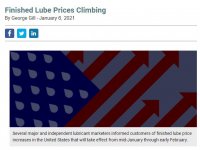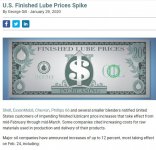wemay
Site Donor 2023

Finished Lube Prices Climbing - Lubes'N'Greases
Several major and independent lubricant marketers informed customers of finished lube price increases in the United States that will take effect from mid-January through early February. Factors cited included rising base oil prices and related costs, such as transportation.
Several major and independent lubricant marketers informed customers of finished lube price increases in the United States that will take effect from mid-January through early February. Factors cited included rising base oil prices and related costs, such as transportation.
Among oil majors, ExxonMobil, Shell, Chevron and Phillips 66 will raise prices by up to 12%.
*Gap. I left out some of the article because it's rather long to post. Click on link for full story*
Contrary to what typically occurs at the end of the year, when base oil producers have to contend with rising inventories and downward price pressure, last November, suppliers raised posted and spot prices. These movements were fueled by healthy demand – both on the domestic and export fronts – against tight base oil availability given that most refineries were running at reduced rates on account of lackluster fuel demand and thin distillate margins.
Firm crude oil values offered further support to the higher base oil numbers. A majority of paraffinic producers and rerefiners raised API Group I, II, II+ and III posted prices by 20, 25, 26 and 30 cents per gallon, depending on the grade, with increases going into effect between Dec. 7 and Dec. 16. The Group II+ and III suppliers had previously also revised postings in late November.
Similarly, naphthenic base oil producers implemented price increases between Dec. 1 and Dec. 18, with values rising by 20, 25 and 30 cents/gal, depending on the viscosity and the producer.
Agashe noted that in addition to increased base oil prices, rising prices for lubricant additives, plastic resin, higher transportation costs and higher manufacturing costs also led to the increased lubricant prices. “For example, Afton Chemicals will increase the price of its lube additives by 8% or more effective Jan. 20,” she added.
She noted that one of the biggest questions surrounding transportation is how spot rates will affect next year’s contracts, as rates averaged 20% to 30% higher than 2019 over the past three months. In this context, she explained, spot rates refers to hiring a logistics company without a 12-month advance negotiated fee and agreeing to instead pay the spot price, which is like the “current ongoing” price as opposed to contracts negotiated in the prior year.


